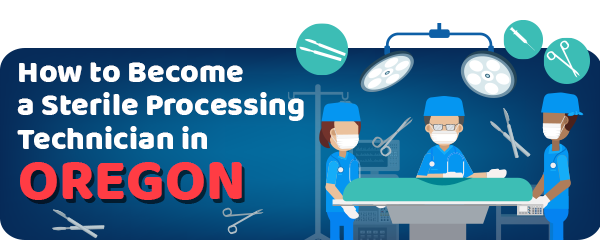The healthcare industry in Oregon offers a favorable working environment characterized by stability and security, making it an appealing choice for many individuals seeking employment.
Compared to other occupations, jobs in this field provide a higher level of job stability.
If you’re considering a career as a sterile processing technician, it’s important to familiarize yourself with the necessary requirements.
In the following sections, we will provide you with a step-by-step guide on how to become a sterile processing technician in Oregon.
Article Table of Contents
Job Duties and Skills of a Sterile Processing Technician in Oregon
In Oregon, obtaining a license for your initial job as a sterile processing technician is not mandatory.
While many medical facilities hire sterile processing technicians, most prefer candidates with prior experience.
Therefore, certification becomes crucial if you want to show you have the skills and knowledge required for the job.
As a sterile processing technician, your daily responsibilities will include:
- Conducting inventory checks
- Managing and monitoring the spread of illness and infection
- Cleaning, sterilizing, packaging, and storing medical instruments
- Maintaining and repairing medical equipment
It is essential to follow specific protocols and methods for the appropriate disinfection and sterilization of medical tools and equipment.
Developing additional skills, such as the following, will also prove beneficial:
- Strong organizational skills
- Problem-solving abilities relevant to the role
- Knowledge of medical terminology
- A thorough understanding of aseptic techniques
Job tasks and required skills may vary depending on the employer and specific work setting.
How to Become a Sterile Processing Technician in Oregon
To obtain certification as a sterile processing technician in Oregon, there are several pathways you can pursue.
The most straightforward method is to take and pass the national certification exam, which typically lasts approximately three hours.
There are various organizations that offer certification exams in Oregon, and one option to consider is the Healthcare Sterile Processing Association (HSPA).
This association provides multiple levels of certification, with entry-level certification being sufficient for most positions.
Following that, you can further enhance your credentials by taking the Certified Registered Central Service Technician (CRCST) certification exam.
Alternatively, you may choose to pursue certification through the Certification Board for Sterile Processing and Distribution (CBSPD).
In addition to passing the certification exam, obtaining a license as a sterile processing technician requires 12 months of relevant experience.
Other requirements include:
- Finishing about 400 hours of lab experience
- Submitting the necessary fees
- Obtaining a high school diploma or GED
- Passing a background check and drug tests
- Successfully passing the licensing exam
It’s important to remember that your sterile processing technician certification will require annual renewal.
Attending additional classes and workshops can be beneficial, as they will keep you updated on industry changes.
Training Programs for Sterile Processing Technicians in Oregon
Oregon offers a variety of educational programs for individuals interested in becoming sterile processing technicians.
Whether you prefer online courses or the hands-on experience of in-person programs, there are options available to cater to your needs.
It’s important to note that the sterile processing programs in Oregon don’t offer financial aid.
If you require financial assistance, it is recommended to directly contact the college or institution offering the program to inquire about any available options.
Portland Community College 
The program, offered by the Institute for Health Professionals, combines self-study materials with hands-on training, totaling 42 hours of comprehensive learning.
By successfully completing this program, you will gain a solid understanding of essential topics such as infection control, medical terminology, and basic anatomy.
Rogue Community College 
It offers a sterile processing technician program specifically designed to prepare students for entry-level positions in healthcare settings.
Through this program, students acquire the necessary technical skills and industry knowledge to become sterile processing technicians.
Mt. Hood Community College 
It provides a program tailored for individuals seeking entry-level positions in the field.
This program features 60 hours of theory and an additional 30 hours of lab-based seminars.
Topics covered in this program encompass crucial aspects such as infection control and sterilization techniques.
| School Name | Address |
|---|---|
| Portland Community College | 705 N Killingsworth St, Portland, OR 97217 |
| Rogue Community College | 3345 Redway Highway, Grants Pass, Oregon |
| Mt. Hood Community College | 26000 SE Stark St, Gresham, OR 97030 |
Sterile Processing Technician Salaries in Oregon
After successfully obtaining your license as a certified sterile processing technician in Oregon, you may be eager to kickstart your job search.
The good news is that finding a position should be a relatively straightforward process.
The healthcare industry includes a diverse range of medical facilities, including hospitals, laboratories, doctor’s offices, clinics, and dental practices.
These institutions consistently seek qualified sterile processing technicians to join their teams.
You may also want to know more about the earning potential associated with a career as a sterile processing technician.
The average salary for individuals in this role is typically calculated on an annual basis, with the figure averaging around $46,000.
However, it’s important to note that specific factors, such as your level of experience within the field, can significantly influence your actual salary.
As you reach milestones and gain more experience, you can expect your remuneration to grow in proportion, reflecting your increased expertise and proficiency.
Annual Salary Range:| Location | Avg. Annual Salary |
|---|---|
| Portland | $47,810 |
| Beaverton | $47,810 |
| Lake Oswego | $47,810 |
| Hillsboro | $47,749 |
| Clackamas | $47,749 |
| Gresham | $47,657 |
| Oregon City | $47,627 |
| Salem | $45,326 |
| Eugene | $45,166 |
| Springfield | $45,066 |
Regional Salary in Oregon
| Region | Employed | Avg. Annual Salary | Avg. Hourly Pay | Top 10% Annual Salary | Bottom 10% Annual Salary |
|---|---|---|---|---|---|
| Bend-Redmond, OR | 100 | $48,030 | $23.09 | $58,850 | $42,910 |
| Corvallis, OR | 40 | $48,280 | $23.21 | $51,780 | $42,460 |
| Eugene, OR | 110 | $47,810 | $22.99 | $59,790 | $36,520 |
| Medford, OR | 80 | $47,670 | $22.92 | $60,260 | $33,910 |
| Portland-Vancouver-Hillsboro, OR-WA | 690 | $52,210 | $25.1 | $67,940 | $36,730 |
| Salem, OR | 100 | $53,300 | $25.63 | $70,790 | $35,090 |
* Employment conditions in your area may vary.
Frequently Asked Questions
Can I advance on the career ladder as a sterile processing technician in Oregon?
Yes and for instance, you can become either a supervisor or manager, or you can study some more and become a registered nurse, licensed nursing practitioner,
Am I legally required to obtain a certification as a sterile processing technician in Oregon?
No, and this is a great position to start either your medical career with, or for your resume.
Read the full guide: How to Become a Sterile Processing Technician



